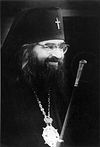

| Previous day | Next day |
| Old Style
June 19
|
Friday |
New Style
July 2
|
|
2nd Week after Pentecost.
Tone 8.
Fast of the Holy Apostles. |
Wine and oil allowed.
|
![]() Holy Apostle Jude, the Brother of the Lord (ca. 80).
Holy Apostle Jude, the Brother of the Lord (ca. 80). ![]() St. John (Maximovitch), archbishop of Shanghai and San Francisco (1966).
St. John (Maximovitch), archbishop of Shanghai and San Francisco (1966). ![]() St. Job, patriarch of Moscow (1607).
St. Job, patriarch of Moscow (1607).
Martyr Zosimas the Soldier, at Antioch in Pisidia (ca. 89-117). St. Paisius the Great, of Egypt (5th c.). St. John the Solitary, of Jerusalem (6th c.). St. Barlaam, monk of Shenkursk (1462). St. Paisius the Bulgarian, of Hilandar, Mt. Athos (18th c.).
Holy Myrrh-bearer Mary, mother of Apostle James (1st c.). St. Macarius of Petra (4th c.). St. Zeno, hermit, of Egypt (4th c.). St. Romuald, abbot of Camaldoli (Ravenna) (1027). Hieromartyr Asyncretus.
Repose of Schemamonk Theoktist, desert-dweller, of Valaam (1863) and Archbishop Leonty of Chile (1971).
Thoughts for Each Day of the Year
According to the Daily Church Readings from the Word of God
By St. Theophan the Recluse

Friday. [Rom. 5:17–6:2; Matt. 9:14–17]
The Lord was asked why His disciples did not fast. He answered that the time for them has not yet come. Then in a parable he showed that in general, the strictness of outer asceticism must be in keeping with the renewal of inner powers of the spirit. First kindle the spirit of fervour, and then take on austerities; for then there will be a new inner power capable of enduring them profitably. If you take them on without first having this fervour, because you were either impressed by the example of others, or wanted to make a show of your own asceticism, then it will bring no profit. You will sustain this austerity for a bit, and then you will weaken and drop it. And you will be worse off than before. Austerity without the inner spirit is like a patch of new linen on an old garment, or new wine in old wineskins. The patch will fall off and the rent made even worse; and the wine will burst the wineskin, and the wine will be lost, and the wineskin ruined. This, by the way, does not mean that austerity is bad, but only suggests that one must begin it in the proper order. The need for it must come from within, so that it might content the heart, and not just press from the outside like a weight.
Articles
 Opening of the Relics, and Glorification of St. John MaximovitchArchpriest Peter Perekrestov"He is incorrupt! His relics are incorrupt!" |
 Martyr Zosimus the Soldier at Antioch, in PisidiaThe Martyr Zosimus lived in the city of Apollona (Thrace) during the reign of Trajan (89-117), the persecutor of Christians. |
 St John the Solitary of JerusalemSaint John the Hermit was an ascetic in Palestine. He passed his days in fasting and prayer in a cave near Jerusalem. |















